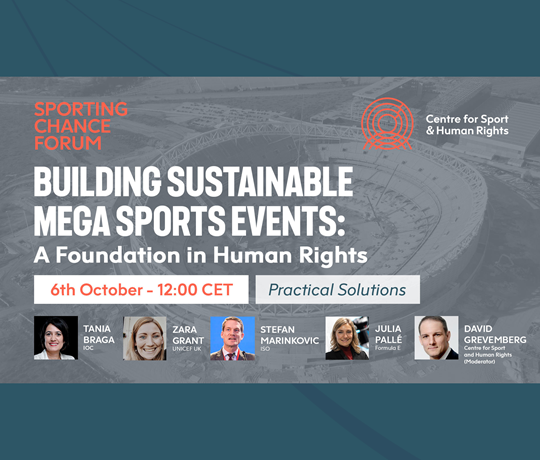Building Sustainable Mega Sports Events: a Foundation in Human Rights
Session Summary
Ideas of sustainable development have slowly started to become mainstream and including their integration into sporting events. These efforts gained traction in 2012 with the creation of ISO 20121 Sustainable Event Management standard which was a legacy of the London 2012 Olympics. It provides guidance on events sustainability including on environmental, social and economic themes and it's now used widely by sport and non-sport events’ organisers.
A proposed annex (Annex D) to the ISO 20121 standard, that newly addresses human and child rights and safeguarding, is currently being developed, led by UNICEF UK and Positive Impact Events, and is soon to be piloted. The creation of this Annex could be a significant development in the sport and human rights field, and for the event sector more broadly.
There are a number of advantages associated with using ISO 20121, these include the fact that ISO20121 can be:
-
- A legitimising symbol demonstrating publicly that an event has been hosted in line with sustainable principles, and
- Applied flexibility and at scale – the creators of the standard were experienced in organising events, and so ensured it was relevant for both large and small events. Smaller events can pick and choose what makes sense for them. ISO is ultimately a tool.
There are also some challenges when it comes to the existing ISO20121 standard and its implementation. These include the fact that it:
-
- Can be time consuming – internal operations need to be aligned and appropriately resourced,
- Requires close attention – the standard is about how you use it for the benefit of people and the planet, and
- Currently does not take a human rights due diligence approach or adequately reflect safeguarding best practice.
The benefits however are significant, many of which can be long lasting. Using ISO 20121 include positives such as that:
-
- Certification requires a strong commitment from senior management, and the fact that a third party is often used to verify use of the standard, can drive senior leaders to pay closer attention, take ownership and develop tangible outcomes for people and the planet, and
- The fact that a serious commitment is required also means that the event organisers become more resilient, see improved brand value, are able to foster organisational cultural change. More agile businesses can react better to challenging situations.
Some of the remaining gaps in the standard include:
-
- Post-Games planning – the standard is only used for the event itself, but legacy is also important, and
- The current absence of human and child rights and safeguarding considerations and approaches from the standard means that outcomes, at present, are typically stronger on the environmental side of the sustainability portfolio.
The Proposal for Annex D is currently in the middle of a consultation process. It has been shared with sport bodies, event organisers and human and child rights experts to gather their feedback. Next steps:
-
- The proposed amendments will be sent to ISO in early 2022 ahead of their review period. This is significant because the ISO standards are only reviewed once every 5 years,
Throughout 2022, pilots are being conducted with Formula E, FIFA and the Birmingham 2022 Commonwealth Games.
Watch the full session here
Click here to watch the SCF21 sessions on demand on YouTube